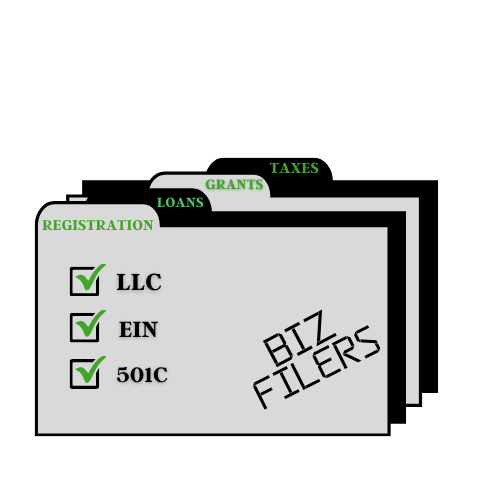
Register your Business
LEGALIZE
GROW
PROTECT
Welcome To Biz Filers
Filings Experts
Here if you need help.
- Register your Business.
- Obtain your Business EIN
- File your Annual Report
- File your Business Taxes
- Protect your Business
- Get Business insurance.
- Build Business Credit
- Apply for Business Grants




1,452 +
Happy Clients

15 +
Years Of Experience

3,452 +
Projects Completed

17 +
Team Members
Our Services
Types of Services
We file the articles of incorporation for all types of businesses in all 50 States.

Filing Articles of Incorporation

Filing EIN Application

Filing Grants Application

Filing ERC Application

Filing loans Application

Filing Business Taxes

BUSINESS FORMATION
For Profit and Not for Profit Business Formation
Business formation types have important similarities and differences..

LLC
The simplest and most flexible way to structure your business to protect personal assets.
Business owners stand to gain many benefits when they register a company as an LLC (Limited Liability Company):
- Limited liability protection. Limited liability protection means that owners are not held personally responsible for business debts and liabilities. When an LLC is filed correctly, only LLC assets, and not personal assets, are used to pay off business debts.
- Pass-through taxation. Typically an LLC does not pay taxes at the business level. Income/loss is reported on the owners’ personal tax returns and any tax due is paid at the individual level.

C CORP & S CORP
The C Corp is a more complex structure that gives you the ability to issue shares, go public, or go global.
S corps are corporations that have elected a special tax status with the IRS
- Limited liability protection. Owners are not typically responsible for S corporation business debts and liabilities.
- Easy transfer of ownership. Ownership is easily transferable through the sale of stock.
- Unlimited life. When an S corporation’s owner incurs a disabling illness or dies, the corporation does not cease to exist.
- Pass-through taxation in the corporate form. S corporation tax status avoids the “double-taxation” associated with C corps.

NON-PROFIT
Nonprofit organizations are groups organized for a good cause rather than for profit. None of a nonprofit organization’s income is distributed to its members, directors, or officers.
- Work on solving issues, creating change, and giving back
- Obtain Internal Revenue Code 501(c)(3) tax-exempt status if eligible
- Qualify for government grants and loans
- Accept tax-exempt funds from another nonprofit through fiscal sponsorship
- Pay yourself a fair salary as part of operating expenses
- File an annual information return with the IRS to maintain your tax-exempt status
